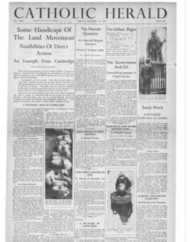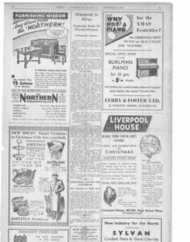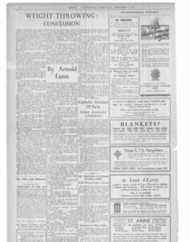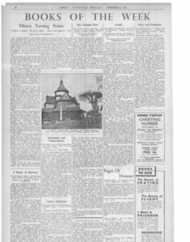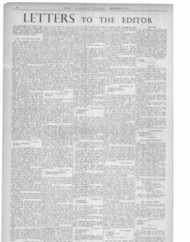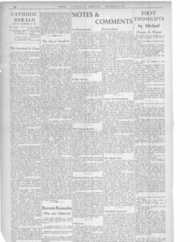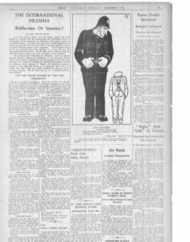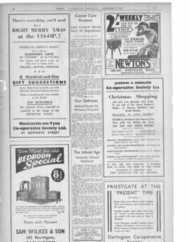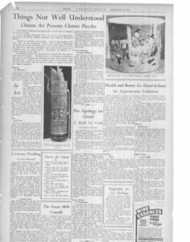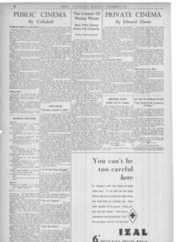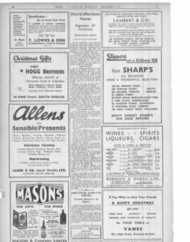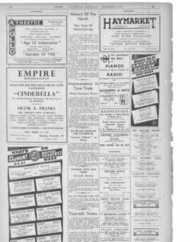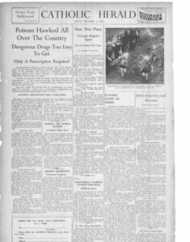Page 13, 13th December 1935
Page 13
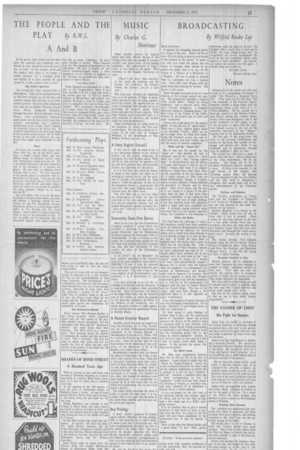
Report an error
Noticed an error on this page?If you've noticed an error in this article please click here to report it.
Tags
Share
Related articles
Music
Music
Music
Elgar-in Retrospect
Elgar Remembered
MUSIC By Charles G.
Mortimer
Some valuable remarks on English music have been offered by one of the foreign critics who was present in London recently and heard many of our leading orchestras. His appreciation of Elgar's music is very much to the point. With reference to the Enigma Variations he says: " There I felt more than elsewhere in his tnusic the freshness and the Serenity, the tenderness, the intimate charm, the humour, too, of a pure soul."
This critic puts forward an interesting view as to the position of Elgar in music, which perhaps we have not quite appreciated in this country. He regards him not so much as breaking fresh ground, but as representing the imitative period which always precedes that of pure creation. With Elgar English music organised itself, as it were, mastered its resources, and became ready for fresh developments.
These developments are being made by the musicians of to-day who have succeeded Elgar. We see such a trend, for instance, in the later work of Vaughan Williams, in the Symphonies of Bax, William Walton and the rest.
A New English School ?
If this view is right we stand to-day at a very interesting moment in our musical history; we are actually witnessing the emergence of a new English school. What will be its fate, how far its members will go, and what position they will eventually achieve, are questions for the future.
It is a very long time since the history of music in this country has taken so interesting an upward curve, and the attention of Europe will doubtless be fixed upon it. Some day perhaps—it may be in the immediate future—a great master will arise who will make English music renowned upon the widest scale.
This view does not in any way slight the achievements of Eiger; no one can strip him of his two supreme gifts; the first was his orchestral mastery, and the second that peculiar genius, the music of a " pure soul referred to in the words of our critic.
Stokovsky Goes One Better
About seven years ago the Gramophone Company produced a record which was probably a revelation to thousands of people—Stokovsky and the Philadelphia Orchestra playing the Nutcracker Suite of Tschaikowsky. It was a revelation in two senses, for it showed many people for the first time what modern electrical recording was like, and also introduced to this country the glory of the Philadelphia Orchestra.
In the H.M.V. list for December we have another recording of this beautiful work by the same conductor and orchestra (DB2540/1/2), and it must be admitted that in this latter recording Stokovsky goes even one better. The suite is one of the most popular of all Tschaikowsky's cornpositions; it is a masterpiece of light music.
Crisp and satisfying as are all the recordings of Stokovsky and his orchestra, it is impossible to imagine a liner recording than this. Take, for instance, the Dance of the Sugar-Plum Fairy and the beautiful tone of the Celeste, or notice the passage for the harp that introduces the Waltz of the Flowers, or the wonderful way in which the great orchestra is held together in the exciting and ever-quickening Trcpak or Russian Dance.
A Noted Kreister Record
Another record that must be singled out from the December list is Fritz Kreisler and the London Philharmonic Orchestra conducted by Sir Landon Ronald in Mendelssohn's Concerto in E. Minor. This is a work that Kreisler has distinctly made his own; from his earliest days he has been famous for his rendering of this concerto, of the Beethoven in D, of the Brahms, and indeed many others.
Mendelssohn's concerto does not plumb the deeps of experience, but it has a character and a suavity of its own. None but a very great musician could have calculated all these beautiful effects for orchestra and soloist, and not a single point is missed by Kreisler. The theme of the slow movement is, of course, very familiar by this time, and though its sentiment may seem hackneyed, it is so wonderfully recreated for us in this record that we are lulled into forgetfulness that we have ever heard it before.
The rondo which concludes the work is taken at exactly the right pace; it is not rushed, while at the same time the pulse of the music beats steadily and the tunes can be heard and enjoyed.
Boy Prodigy
A great violinist appeared in London again recently, Menuhin, the boy prodigy, who is now growing up to man's estate. It seems a pity that a pianoforte was the only accompaniment provided for him at his recital in the Albert Hall. The concertos he played, especially the Max Bruch, demanded orchestral colour and the fullness of orchestral accompaniment; but, as to the technical skill and individual genius of this violinist there is no shadow of doubt.
• LTA nn his hoo rd in Istin uinelec tho
DEAR LISTENER 1 suppose the struggling musical genius is a thing of the past. There will be no more Mozarts dying in poverty and buried at the expense of the parish. It seems a pity that now when the genius has no longer to struggle. there should be no genius—no giant, that is to say, of the stature of a Mozart or a Beethoven or a Wagner. No one is going to pretend there is, I presume; not even a musical critic. Since 1883, when Wagner died, the giants have been looking for an heir. The throne is still vacant.
These thoughts occurred to me as I was listening to the evening concert last Sunday. The programme included a modern work, Arthur Bliss's " Music for String Orchestra," and a classical work, Schubert's Seventh Symphony. I imagined these two composers changing places: Mr. Bliss living in the Vienna of the 1820's, Schubert in the present age of radio and quick reputations.
Vienna was a bad place for the musical genius. It was the city of " good timers." There was a hard, electric gaiety about it, an incurable frivolity, which we are apt to forget when we think how musicloving the Viennese people are, and always have been, and how Vienna was in fact the mecca of musical composers.
Music and the "Smart Set" But it was not the people but the " smart set " who decided the fate of musicians; and all the " smart set " cared about was " kick "—and " having a good time." It adored Rossini and the waltzes of Lanner and Strauss; it had no use for Weber: Chopin fled from it in disgust; Beethoven would have died there wanting the necessities of his last illness, but for a timely present of £100 from the Royal Philharmonic Society of London; and as for poor Schubert, Vienna followed the precedent of Mozart and let him starve. Most of his music, and the best of it, was found in a corner of his bedroom when he died. It had never been played or published. It was valued by the authorities at the sum of eight shillings. It was then bundled away into cupboards where it might well have crumbled into dust. It included, among countless songs and much that is in our regular repertoire to-day, the symphony I was listening to.
Music and Radio If it had been the radio-age, of course, that symphony would have been snatched up by the Austrian Broadcasting Corporation –always on the look-out for local talent—and it would have been listened to in a Cotswold cottage, as it was on Sun day last. It would not have been a hundred years old classic, but a score on which the ink was hardly dry. And, if I had been one of those listeners, 1 should not have understood one note of it! I should either have switched off in impatience—as I do with most of the " advanced " music of to-day—or I should have burst into uncontrollable laughter. Because this is exactly what did happen when the symphony was subsequently unearthed. by Mendelssohre and Mendelssohn tried to rehearse it in London. The orchestra laughed so much that Mendelssohn had to give it up; and the symphony had to wait for its first performance in England until the days of August Manns and the Crystal Palace. This was in the 'sixties; and even then, though a few highbrows liked it, it was regarded as pretty revolutionary.
It was this question of music's having to wait that principally concerned me. To us to-day, Schubert's is such limpid music; a child can understand it To what extent is radio helping to shorten what •I may call the incubation period of " advanced" music—the period necessary for the ear of the ordinary man to accustom itself to new rhythms, new melodic forms? Surely it helps enormously to familiarise a new idiom, with the result that the incubation period will in the future be almost negligible? Genius, in fact, will have such an easy time of it that it will be hardly worth while being a genius. Is this perhaps the reason why there are no giants?
Mr. Bliss's Luck Mr. Bliss may congratulate himself, then, that he did not live in the days of Schubert. I must hasten to admit that his " Music for String Orchestra" struck me as extraordinarily beautiful; for once I had not the slightest temptation to switch off; so perhaps it is not so very " modern," after all! Anyhow, a hundred years ago a work corresponding to that in "modernity" would have had little chance of a hearing in Vienna. or anywhere clsc, and none whatever of so immediate a hearing before a world-audience.
It was performed for the first time at the Salzburg festival this summer under Dr. Boult, and for the first time in England a few weeks ago at a B.B.C. symphony concert.
It is an excellent idea to give a second broadcast of new works as soon as possible after the first. In a year or two the work will have been assimilated by the least-tutored ear. It may be already a classic.
Now, is this what the history-books call " a good thing" or not? Does genius
blog comments powered by Disqus


